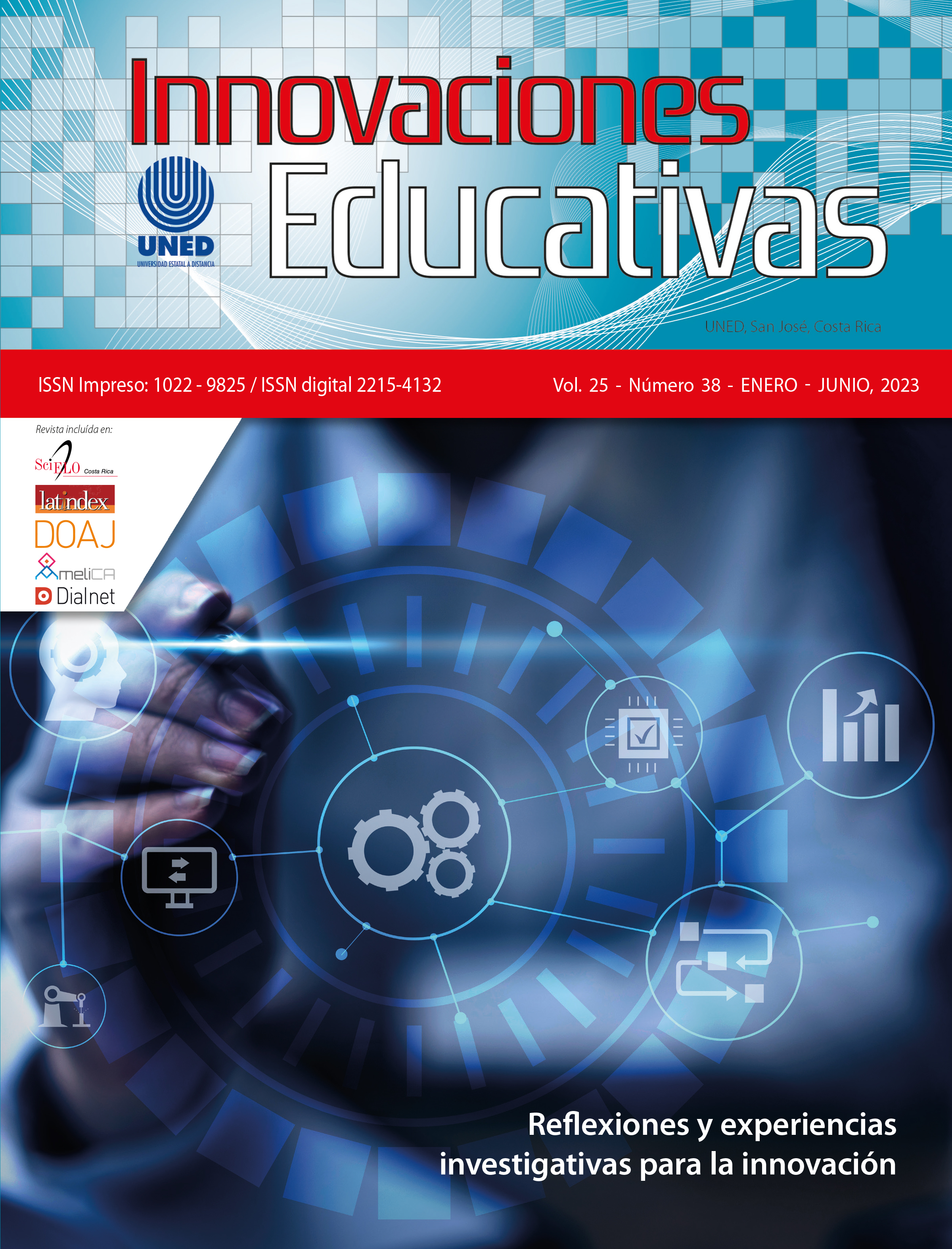Analysis of emotional self-regulation in toddlers and preschoolers (interactive group II) in the GAM-Guanacaste transition program during the "Aprendo en casa" strategy due to COVID-19
DOI:
https://doi.org/10.22458/ie.v25i38.4506Keywords:
basic emotions, COVID-19, self-regulation, family, learning, early childhood, childhoodAbstract
During 2020, as a result of the global COVID-19 outbreak, sanitary measures were taken in Costa Rica to prevent the spread, including lockdown. Therefore, the Ministry of Public Education established the "Aprendo en casa" strategy so that the learning process suffered less affectation. The research was carried out with the toddlers and preschoolers of the Maternal and Preschool programs (interactive II) and Transition cycles GAM-Guanacaste, as well as the teachers and legal caregivers of this population. The family environment of each student, their learning environments, and emotional self-regulation practices were analyzed during the COVID-19 outbreak new reality. Because the research is within the positivist paradigm and the quantitative approach, the information collected was analyzed through statistical data. It determined that the analysis of patterns in the behavior of the early childhood student, as well as establishing some causes or crises, such as changes in eating habits, sleep routines, irritability, and anxiety, among others. It allowed us to visualize the effects of the lockdown at a pedagogical-emotional level in early childhood learners due to the pandemic. The possibilities of socializing, recreation spaces, and outdoor activities were reduced, and they stopped sharing with other family members and/or participating in celebrations.
References
Alonso, M. (2020). La cuarentena y nosotros: Psicología y psicoterapia en nuevos tiempos de crisis. SIP Bulletin, número especial, 42-46. https://sipsych.org/publications/sip-bulletin
Berasategi, N.; Idoiaga, N.; Dosil, M.; Eiguren, A.; Pikaza, M. y Ozamiz, N. (2020). Las voces de los niños y de las niñas en situación de confinamiento por el COVID-19. Universidad del País Vasco. https://www.observatoriodelainfancia.es/oia/esp/documentos_ficha.aspx?id=7105
Carazo, V. y López, L. (2017). Aprendizaje, Coevolución Neuroambiental. Coordinación Educativa y Cultural Centroamericana, CECC/SICA.
Coalición Española por los Derechos de la Infancia (2020). The UN Committee on the Rights of the Child warns of the serious physical, emotional and psychological impact of COVID on children and calls on States to take action. https://cutt. ly/iyy8zvW
CEPAL-UNESCO. (2020). Informe: La educación en tiempos de la pandemia de COVID-19.
CEREBRUM. (2020a). Neurodesarrollo de la Primera Infancia. Módulo 3: Factores socioemocionales en la primera infancia. Brainbox.
CEREBRUM. (2020b). Funciones cerebrales superiores. Módulo 7: ¿Somos seres emocionales o racionales? Brainbox.
Dalton, L.; Rapa, E. y Stein, A. (2020). Protecting the psychological health of children through effective communication about COVID-19. The Lancet, 4(5), 346-347. https://doi: 10.1016/S2352-4642(20)30097-3
Dávila, X. y Maturana, H. (2015). El árbol del vivir. Editorial MVP.
Etchebehere, G.; De León, R.; Silva, F.; Fernández, D. y Quintana, S. (2021). Percepciones y emociones ante la pandemia: recogiendo las voces de niños y niñas de una institución de educación inicial pública del Uruguay. Psicología, Conocimiento y Sociedad, 11(1), 8-35. https://doi.org/10.26864/PCS.v11.n1.1
Fondo de las Naciones Unidas para la Infancia. (2020). Salud mental e infancia en el escenario de la covid-19. Propuestas de UNICEF España. https://www.consaludmental.org/publicaciones/Salud-Mental-infancia-adolescencia-covid-19.pdf
Fundación Educación 2020. (2020). Informe de resultados #EstamosConectados. Testimonios y experiencias de las comunidades educativas ante la crisis sanitaria. https://educacion2020.cl/wp-content/uploads/2020/04/Informe-Final-Encuesta-EstamosConectados-E2020.pdf
Grechyna, D. (2020). Health Threats Associated with Children Lockdown in Spain during COVID-1. https://doi.org/10.2139/ssrn.3567670
Luna, S. (2020). La violencia intrafamiliar: Una pandemia que se visibiliza. SIP Bulletin, número especial, 26-28. https://sipsych.org/publications/sip-bulletin
Ministerio de Educación Pública [MEP] (2020). Orientaciones para el apoyo del proceso educativo a distancia.
Ministerio de Salud/MEP. (2020). Resolución N° MS-DM-2592-2020 / MEP-00713-2020. https://www.mep.go.cr/sites/default/files/page/adjuntos/ms-dm-2592-2020mep-00713-2020versio%CC%81n-firmada.pdf
Montroy, J.; Bowles, P.; Skibbe, E.; McClelland, M. y Morrison, J. (2016). The Development of Self-Regulation Across Early Childhood. Developmental Psychology, 52(11),1744-1762. http://dx.doi.org/10.1037/dev0000159
Organización Mundial de la Salud. (2020). Coronavirus disease (COVID-19) outbreak situation. https://www.who.int/emergencies/diseases/novel-coronavirus - 2019
Organización Panamericana de la Salud [OPS] (2020). La OMS caracteriza a covid-19 como una pandemia. https://www.paho.org/es/noticias/11-3-2020-oms-caracteriza-covid-19-como-pandemia
Peinado, A. y Gallego, R. (2016). Programa arco iris de educación emocional. De 3 a 12 años. Editorial Tarragona.
Shunk, D. (2012). Teorías del aprendizaje. Una perspectiva educativa. Editorial Pearson.
Wang, G.; Zhang, Y.; Zhao, J.; Zhang, J. y Jiang, F. (2020). Mitigate the effects of home confinement on children during the COVID-19 outbreak. The Lancet, 395(10228), 945-947. https://doi.org/10.1016/S0140-6736(20)30547-X
Downloads
Published
How to Cite
Issue
Section
License
Copyright (c) 2023 Innovaciones Educativas

This work is licensed under a Creative Commons Attribution-NonCommercial-NoDerivatives 4.0 International License.









